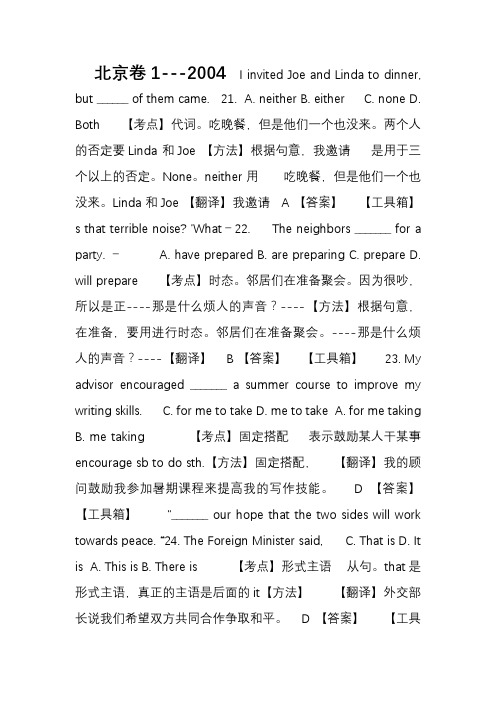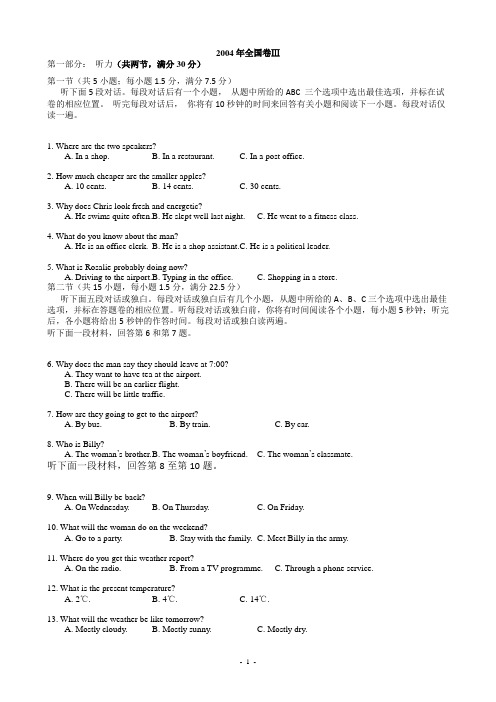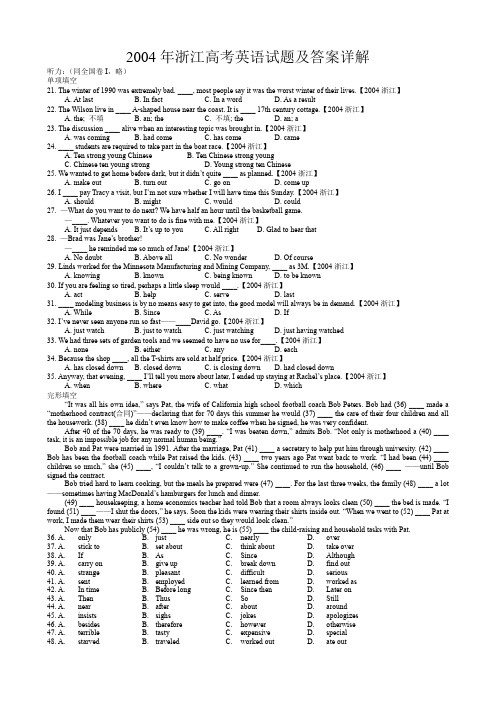历年解析2004年高考备考研讨会英语科讲座
2004年全国各省高考英语真题解析

北京卷1---2004I invited Joe and Linda to dinner, but ______ of them came. 21. A. neither B. either C. none D. Both 【考点】代词。
吃晚餐,但是他们一个也没来。
两个人的否定要Linda 和Joe 【方法】根据句意,我邀请是用于三个以上的否定。
None。
neither用吃晚餐,但是他们一个也没来。
Linda 和Joe 【翻译】我邀请 A 【答案】【工具箱】s that terrible noise? ’What-22. The neighbors _______ for a party. -A. have prepared B. are preparing C. prepare D. will prepare 【考点】时态。
邻居们在准备聚会。
因为很吵,所以是正----那是什么烦人的声音?----【方法】根据句意,在准备,要用进行时态。
邻居们在准备聚会。
----那是什么烦人的声音?----【翻译】B 【答案】【工具箱】 23. My advisor encouraged _______ a summer course to improve my writing skills. C. for me to take D. me to take A. for me taking B. me taking 【考点】固定搭配表示鼓励某人干某事encourage sb to do sth.【方法】固定搭配,【翻译】我的顾问鼓励我参加暑期课程来提高我的写作技能。
D 【答案】【工具箱】”_______ our hope that the two sides will work towards peace. “24. The Foreign Minister said, C. That is D. It is A. This is B. There is 【考点】形式主语从句。
2004英语配有解析

2004年普通高等学校招生全国统一考试(广东卷)英语本试卷分第I卷(选择题)和第ll卷(非选择题)两部分。
共150分。
考试时间l20分钟。
第I卷(选择题共ll5分)第一部分听力(共两节,满分30分)第一节(共5小题;每小题l.5分。
满分7.5分)听下面S段对诘。
每段对话后有一个小题,从题中所给的A、B、c三个选项中选出最佳选项。
听完每段对话后,你都有10秒钟的时间来回答有关小题和阅读下一小题。
每段对话仅读一谝.1. What was’ the man?A. A cook.B. A waiter.C. A manager.2. How much time will it take Peter to finish his homework?A. Half an hour.B. An hour.C. Two hours.3. Where probably is the man now?A, In a car. B. In the office. C. In the sports field.4. What does the woman mean?A. She accepted the offer of help.B. She politely refused the offer of help.C. Her son.wouldn't arrive there right then.5. What is Helen's idea about the skirt?A. The color of the skirt is bright.B. The color does not quite suit her.C. Her friend has made a right choice.第二节(共15小题;每小题l.5分,满分22.5分) .听下面5段对话或独自。
每段对话或独白后有几个小题,从题中所给的A:B、C三个选项中选出最佳选项。
2004年高考英语(全国卷1)

2004年普通高等学校招生全国统一考试(全国一)英语听力:1、What do we learn about the man?A. He slept well on the plane.B. He had a long trip.C. He had a meeting.2、Why will the woman stay home in the evening?A. To wait for a call.B. To watch a ball game on TV.C. To have dinner with a friend.3、What gift will the woman probably get for Mary?A. A school bag.B. A record.C. A theatre ticket.4、What does the man mainly do in his spare time?A. Learn a language.B. Do some sports.C. Play the piano.5、What did the woman like doing when she was young?A. Riding a bicycle with friends.B. Travelling the country.C. Reading alone.6、Where does the conversation take place?A. In a hotel.B. At a booking office.C. At a friend’s house.7、What will the man probably do in a few days?A. Fly to another country.B. Come to the same hotel.C. Drive here to visit friends.8、What did the man worry about at the beginning of the conversation?A. He might not find everything he wanted.B. He might not have enough money with him.C. He might not be able to carry the shopping.9、How much should the man pay?A. $5.B. $75.C. $75.05.10、What did the woman do in the end?A. She charged the man a little less.B. She asked the man to pay her later.C. She made a mistake in adding up the cost.11、Where are the speakers?A. In a classroom.B. In a theatre.C. In an office.12、Why does the man plan to leave early?A. He is going on vacation.B. He is going to a performance.C. He is going to the post office.13、What does the woman offer to do?A. Clean the office.B. Pick up the man’s son.C. Finish the man’s work.14、How does the woman feel at the beginning of the conversation?A. Angry.B. Surprised.C. Sad15、What size bag does the woman want?A. A 24-inch bag.B. A 29-inch bag.C. A 32-inch bag.16、When will the woman leave for Mexico?A. On Thursday.B. On Friday.C. On Saturday.17、Where does the man work?A. At a mail order company.B. At an international travel service.C. At the airport information desk.18、Why did the woman not go to college?A. She didn’t pass the exam.B. She wasn’t interested in college.C. She couldn’t afford college education.19、What job does the woman say she did?A. She was a bus conductor.B. She was a shop assistant.C. She was a housekeeper.20、What did the woman think of her friend’s college life?A. It was busy.B. It was wonderful.C. It was dull.听力原文Text 1.W: Good morning, Mr. Li. Did you sl eep well l ast night after your l ong flight?M: Good morning. Yes, I did. I feel totally rested and I’m now ready for our meeting.Text 2.M: We coul d go to a ball game this evening or woul d you rather eat in a restaurant and then see a film?W: To tell you the t ruth, I can’t really go anywhere this evening, because I’m expecting an important phone call.Text 3.W: Have you got any id ea about what to buy for Mary’s birthday?M: Well, I’ll get her a new schoolbag, and I prom ise to take her to a film. What about you?W: Oh, I haven’t d ecid ed yet. I’ll probably buy her that new music record, as she likes it so much.Text 4.W: So, what d o you usually d o in your free time?M: At the moment I’m spending much of my free t ime l earning German. I also enjoy pl aying the piano.W: Do you play any sports?M: Not much. But I go to the sports club and work out once a week.Text 5.M: Did you have a l ot of friends when you were young?W: I did n’t really make any cl ose fr iends then because I like going off in the morning. And I mean, this was on the school holidays: riding a bike away with a few books in the basket and finding a nice place to read.Text 6.M: Well, we’ll certainly st ay here again next time we’re passi ng through.W: Good. Do l et us know in advance and we’ll try to get you the same room.M: That woul d be l ovely. It may be quite soon in fact.W: Oh? How is that?M: Well. We are driving to the South of Spain in the next coupl e of days and we may come back this way.W: Do give us a ring if you d ecid e to. I hope you’ll have a pl easant trip.Text 7.M: Great! This supermarket has everything. I hope this comes to und er 75 d ollars because I d on’t have much money l eft.W: That comes to 75 d ollars and 5 cents.M: I knew it. I knew I’d be over.W: Well. Don’t worry about the 5 cents. They’ll go. Have a nice d ay.M: Well. Thank you. See you again.Text 8.W: John, I thought you were going to l eave early today to t ake your son to the show.M: I’m still planning to. But I can’t l eave until I finish typing all the l etters.W: Can you l eave that until tomorrow?M: No. The boss wants them first thing tomorrow morning.W: How many have you got l eft?M: About five.W: Why d on’t you just go ahead, John? I’ll d o the l etters for you.M: Thank you very much, Janet. You’re so kind.Text 9.M: Customer Service. Andney Grant speaking. How may I help you?W: I can’t believe this is happening. I call ed and ord ered a 32-inch bag last Frid ay. But today I found that you sent a 24-inch one. I was planning to use that bag during our vacation in Mexico, but it d oesn’t seem possibl e any more because we will t ake off on Saturday. It’s only two days away. What am I supposed to d o?M: I’m really sorry, madam. I’ll check right away. Woul d you pl ease tell me your ord er number?W: It’s CE2938.M: Just a minute. I d o apol ogize, madam. There did seem to be a mistake. I’ll have the correct size bag sent to you by overnight mail right away. It will arrive in time for your Saturd ay trip. Again I apol ogize for any inconvenience caused by our mistake. I promise it won’t happen again.W: Ok. Well. Thank you.M: Thank you, madam, for choosing Linch Mail. I hope you will a wond erful vacation.Text 10.M: Juliet, you chose not to go to coll ege. Why? Was it about money?W: Well. I d on’t want to sit here and say I was too poor to go to coll ege. But the fact is that we didn’t have the money, though my mum probably coul d have mad e enough somehow. I p robably coul d have worked hard er at school and gotten bet ter grad es, so, it is really, I did n’t get to go to coll ege. I had a wish to go back to school every other week. It wasn’t just my path.M: At the time did you feel that you were missing something?W: My best friend went off to university and I just remember every time I t alk to her. It all sound ed so fun and so great. Here I was selling tennis shoes and getting on the bus every day to work in town. We both thought the other’s life was so much mor e exciting. I was t rying hard to make enough to pay for my own flat every month and that seemed so exciting to her. And she woul d t alk about studying for finals, and going to parties, and I thought, God, she is so perfect.2005年普通高等学校招生全国统一考试(全国一)英语第一节(共5小题;每小题1.5分,满分7.5分)听下面5段对话。
2004年高考英语试卷分析(全国卷)(中学英语教学论文)

2004年高考英语试卷分析(全国卷)(中学英语教学论文)(河北、河南、福建等)河北定兴第三中学陈国 2004.7一、总体评价与往年相比,2004年高考英语试卷(全国卷)基本保持了命题的思路和风格,内容更贴近生活、贴近时代,知识覆盖面广,更加注重考查考生的实际运用能力。
2004年的试题总体体现了稳中求发展、稳中有变的命题原则,整套试卷的难度略低于去年,但更加强调语言运用理念,试卷内容也更具现代气息。
它有利于高校选拔人才,有利于中学素质教育的推进,对中学英语的教学也具有积极的指导意义。
试题的命制立足于现行的英语教学大纲和考试说明,继续坚持了英语测试改革的总体方向:突出语篇,强调应用,注重实际。
具体体现在以下几个方面:1、题型结构与去年相同;2、全卷的总体难度与前几年基本一致;3、继续强调语言测试的交际性原则;4、适当调整试卷中部分试题的难度,知识性题目的难度与2003年持平,考查的内容保证了知识的覆盖面;5、试卷中不注释汉语的生词较往年减少;6、在稳定试题难度的情况下,再次降低了阅读理解部分对学生读速的要求。
今年,该部分仍由5篇短文组成,单词量为1936个,是自1999年以来的最低点。
二、试题分析第一部分听力交流为本、生活为源2004年英语高考听力试题的模式没有改变,分值仍为30分。
语速恰当,难度适宜。
在设题上侧重考察考生在规定时间内对所听到的语言材料的反应能力和理解能力。
语速略低于2002年,与2003年基本持平。
听力材料内容十分贴近生活,没有生僻的地名,听力选材100%来源生活,体现生活情景。
录音材料的长度、话题及试题设计等均符合考试说明的要求,难度与去年基本持平,问题的设置包括有关话题的原因、背景、意图、价格、爱好、职业、数字、态度等。
试题从以下几个方面考查了考生的听力水平:1、理解主旨、要义;2、获取事实性的具体信息;3、对说话的背景、说话者之间的关系等能作出简单的推断;4、理解说话者的意图、观点或态度。
2004高考英语全国卷试题及详解

2004年全国卷Ⅲ第一部分:听力(共两节,满分30分)第一节(共5小题;每小题1.5分,满分7.5分)听下面5段对话。
每段对话后有一个小题,从题中所给的ABC 三个选项中选出最佳选项,并标在试卷的相应位置。
听完每段对话后,你将有10秒钟的时间来回答有关小题和阅读下一小题。
每段对话仅读一遍。
1. Where are the two speakers?A. In a shop.B. In a restaurant.C. In a post office.2. How much cheaper are the smaller apples?A. 10 cents.B. 14 cents.C. 30 cents.3. Why does Chris look fresh and energetic?A. He swims quite often.B. He slept well last night.C. He went to a fitness class.4. What do you know about the man?A. He is an office clerk.B. He is a shop assistant.C. He is a political leader.5. What is Rosalie probably doing now?A. Driving to the airport.B. Typing in the office.C. Shopping in a store.第二节(共15小题,每小题1.5分,满分22.5分)听下面五段对话或独白。
每段对话或独白后有几个小题,从题中所给的A、B、C三个选项中选出最佳选项,并标在答题卷的相应位置。
听每段对话或独白前,你将有时间阅读各个小题,每小题5秒钟;听完后,各小题将给出5秒钟的作答时间。
每段对话或独白读两遍。
听下面一段材料,回答第6和第7题。
2004年浙江高考英语试题及答案详解

听力:(同全国卷 I,略)
单项填空
21. The winter of 1990 was extremely bad. ____, most people say it was the worst winter of their lives.【2004 浙江】
A. At last
A. has closed down B. closed down
C. is closing down D. had closed down
35. Anyway, that evening, ____ I’ll tell you more about later, I ended up staying at Rachel’s place.【2004 浙江】
D. to be known
30. If you are feeling so tired, perhaps a little sleep would ____.【2004 浙江】
A. act
B. help
C. serve
D. last
31. ____ modeling business is by no means easy to get into, the good model will always be in demand.【2004 浙江】
A. when 完形填空
B. where
C. what
D. which
“It was all his own idea,” says Pat, the wife of California high school football coach Bob Peters. Bob had (36) ____ made a “motherhood contract(合同)”——declaring that for 70 days this summer he would (37) ____ the care of their four children and all
讲座2004年高考备语科考研讨会英语科
2004年高考备考研讨会英语科讲座北京钢铁学院附中张铁城一、2004年―考试说明‖要点不变:基本―指导思想:稳定中,求发展‖。
(1)向国外先进外语教学寻求发展:只考查语言能力。
不考查语言知识。
(2)考虑我国外语教学的现状:还要以考查知识为辅,以求稳定。
(3)要求考查实际情景中的交际能力以及相关能力,逐步加大力度。
(4)现实局限:只考听、读、写以及―语言知识‖四部分,暂时不考―口试‖。
(5)听力理解部分:―该项语言技能的重要性日益明显。
‖(6)“语言知识”部分:“单项填空”“强调应用”,其“情境理解和语言运用的味道浓厚”。
“完形填空”“是综合性题型,既考查词汇知识,也考查阅读理解能力。
”(7)―阅读理解‖―在试卷中占比重较大‖。
(8)“短文改错”题,既考查知识又考查阅读能力,没有整体理解便不能完成。
(9)―书面表达‖题,测试在―特定情景中,按特定要求‖的表达能力。
二、004年高考复习的基本方法1.英语备考须知例一:All the larky toapes frabjously breadled into a paraful groal.例二:路透社讯:2003年7月9日在意大利北部城市帕多瓦举行第七届世界机器人足球锦标赛,图为赛前球员们站在足球面前各就各位。
(Team of robots positioned in front of the ball prior to the start of their match during the Seventh Soccer World Championship for Robots in Padua, northern Italy, on July 9. REUTERS )从以上的两个例子可以看到,英语的三项语法基本要素。
(1)三项语法基本要素:其一,英语与汉语的“词序”word order或―语序‖不一样;其二,汉语没有英语那样的“结构词”structural words,如:介词、连词、代词、关系代(副)词、情态(助)动词、冠词、常用副词等等―小词‖或虚词。
2004 年英语高考复习的思考
2004年英语高考复习的思考镇江第一中学外语组章洪霞04年高考是江苏省首次自主命题,仍使用全国统一的考试大纲和考试说明。
根据2004年《考试大纲》、《考试说明》及三月十二日在南京召开的2004高考新考试说明信息与分析交流会议精神,04年英语高考命题的指导思想是:在稳定中求发展。
命题原则仍然是:注重基础、强调运用、突出能力;试卷的题型结构与往年完全一致;试卷难度与前几年基本一致。
纵观近年的英语高考试题,对语言知识的考查均置于特定的语境中,具有综合性与交际性的特点,其目的不仅是考查语言知识,更主要是考查语言运用能力,尤其是近两三年对语言交际能力考查的力度逐年加大。
因此在最后的复习阶段高三教师如何通过系统的复习使学生加深对所学语言知识的理解和提高学生运用英语进行交际的能力就显得极为重要。
高三年级学生的思维特点是由形象思维转变为逻辑思维,并且从经验型的抽象思维逐步向理论型的抽象逻辑思维的转化。
高三英语复习,如果采用逐课复习的方法,势必使学生产生厌烦情绪,削弱记忆力。
笔者认为在复习过程中,教师应以夯实基础为前提,按照词汇和语法这两个系统将分散在各册课本中的语言知识提炼出来,把丰富的语言材料从横向及纵向进行归纳,使之形成一个有机的整体,让所学的知识在学生头脑中形成一个相互联系的知识网络。
以词汇复习为例,许多英语单词或词组都是一词多义,用法灵活,在不同的语境中具有不同的意义。
一个词与不同的词搭配,构成不同的词组也会产生不同的意义。
如果按照课本或高考词汇表顺序把所学的词汇过一遍,时间不允许,学生也难以掌握和运用。
教师应以教材为中心,把课本中出现频率较高的词汇,尤其是动词筛选出来,结合句子,创设语境来复习词的用法,培养学生根据语境推判断单词或词组的特定含义的能力。
例如,一个非常简单的单词“fire”##在以下几个句子中分别具有不同的词性和词义:1.A fire broke out in that house last night. 2.It was so cold that they made a fire to warm themselves.3.John was fired because of the accident caused by his carelessness.4.“Don’t fire at me.”the enemy soldier cried, raised both his hands and gave in.另外,有许多英语词组是“一义多式”,例如表示“不得不做某事”这一意思可用have to do sth. \ have no choice but to do sth..\ can do nothing but do sth.\ can’t but do sth. \ can’t choose but do sth.等。
江苏高考英语备考研讨会心得
2010年江苏高考英语备考研讨会心得2010年江苏高考英语备考研讨会心得golden 2009-12-162009年12月11日至13日,本人到南京师范大学外国语学院随园校区,参加2010年江苏高考英语备考研讨会。
在此期间,共计听了四场专家报告:无锡市教研室主任马岳年教授做的报告“高考预测备考——我们该做什么?”,南京师范大学外国语学院张伊娜教授做的报告“高中英语阅读教学问题与思考”,江苏教育学院英语系主任曹亚民教授做的报告“标准化测试命题技术”,和南京师范大学外国语学院英语系主任汪少华教授做的报告“2009年高考英语阅卷分析及2010年高考复习指导”,受益匪浅,现归纳如下:一、2009年江苏英语高考卷与2008年江苏卷的比较1、听力的语速有所加快:2008年的速度为115 w/m,而2009年的速度可能是185 w/m (南通市曹力城老师提供的统计数据,以下同)。
2、单词增长了:每个单词的平均字符数:2008卷为4.4,而2009卷为4.6。
3、句子增长了:每个句子的平均词数:2008卷为13.7,而2009卷为15.8。
4、生词增加了:2008卷:非课标词汇为51个,派生词为44个,而2009卷:分别为67个和62个。
5、卷面总词数增加,就完形填空、阅读理解和任务型阅读部分看,2008年总词数为:2137,而2009卷为:2226。
6、阅读理解、任务型阅读和书面表达难度普遍增加。
2009年江苏省英语高考试卷在阅读理解题中,有少数考题与考查阅读理解能力的关系不直接。
7、总体上说,2009江苏卷比2008江苏卷难度增加了,全省英语高考均分起码下降7分。
假如说2008年全省均分为73分(难度系数为0.61),那么2009年应该是66分左右(难度系数为0.55)。
难度系数0.65均分应该是78分。
结论:根据以上分析,结合我省英语高考近几年来的一贯做法、省考试院的一贯思想和《2010年普通高等学校招生全国统一考试(江苏卷)说明》精神,我们是否可以得出这样的结论——在主观上命题者不会再加大难度了,也就是说,2010年的江苏省英语高考试题难度不会超出2009年的难度。
李达荣评析2004年高考试题全国卷-英语
李达荣评析2004年高考试题全国卷2004年普通高等学校招生全国统一考试英语试题,进一步贯彻了《中共中央、国务院关于深化改革,全面推进素质教育的决定》精神,体现了国家教委深化高考改革的指导思想,落实了英语科《考试说明》的要求,坚持了试题相对稳定,但又在稳定中求发展的思想,使试题有较高的可信度、可效度和区分度。
它全面科学地测试了学生的英语水平和综合应用语言的能力。
这样既有利于高校选拔人才,同时又会对中学英语教学的改革起着良好的导向作用。
一、具有科学性1.明确的命题方针、命题原则和命题特点2004年高考命题的方针是五个字:“能力和应用”。
试卷从头至尾较好地体现了命题的原则;努力完成一个“转向”,即从过去考查学生的语言结构和语言形式转向现在注重考查学生的语言意识。
这是一个根本的转变。
命题的特点是拉开考生的区分度,不是依据于死记和硬背,而是落实在学生的语言经验和语言意识上。
2.命题严格遵循了《考试说明》,较好地体现了改革精神。
选择性考试的特点鲜明,能够较真实地对考生的英语能力作出客观的评价。
二、注重实用性试题从始至终都融于情景之中,强化其语言在不同情景中的“应用性”,特别是对语言表达的考查,写作部分内容真实,贴近生活,体裁均为应用文体实用性很强。
考查了学生语言是否连贯得体,表达交际准确,克服了“为考而考”的文字游戏,强化了英语命题服务于“语言表达,思想交流,学习生活”的基本思想。
三、明确导向性1.试题有助于调动学生的积极性长时间以来英语教学出现了一种被动的局面,“初一朵朵红花,初二两极分化,初三天上地下”,学生没有积极性,两极分化十分严重。
随着高考命题的改革、发展,对中学英语教学的改革起着良好的导向作用。
比如听力试题的诞生极大地调动了学生的积极性,结束了“哑巴外语”的教学局面。
2.过去的教学体系是“词词个个开花,句句语法分析”而今高考命题是从多方面检查考生的英语水平。
如语法知识的运用能力;词组的搭配和习惯用法;对词义的正确理解。
- 1、下载文档前请自行甄别文档内容的完整性,平台不提供额外的编辑、内容补充、找答案等附加服务。
- 2、"仅部分预览"的文档,不可在线预览部分如存在完整性等问题,可反馈申请退款(可完整预览的文档不适用该条件!)。
- 3、如文档侵犯您的权益,请联系客服反馈,我们会尽快为您处理(人工客服工作时间:9:00-18:30)。
⏹掌握NE5000E/80E/40E产品的体系结构⏹掌握NE5000E/80E/40E的单板构成⏹掌握NE5000E/80E/40E换板操作⏹了解NE5000E/80E/40E升级操作2004年高考备考研讨会英语科讲座北京钢铁学院附中张铁城一、2004年―考试说明‖要点不变:基本―指导思想:稳定中,求发展‖。
(1)向国外先进外语教学寻求发展:只考查语言能力。
不考查语言知识。
(2)考虑我国外语教学的现状:还要以考查知识为辅,以求稳定。
(3)要求考查实际情景中的交际能力以及相关能力,逐步加大力度。
(4)现实局限:只考听、读、写以及―语言知识‖四部分,暂时不考―口试‖。
(5)听力理解部分:―该项语言技能的重要性日益明显。
‖(6)“语言知识”部分:“单项填空”“强调应用”,其“情境理解和语言运用的味道浓厚”。
“完形填空”“是综合性题型,既考查词汇知识,也考查阅读理解能力。
”(7)―阅读理解‖―在试卷中占比重较大‖。
(8)“短文改错”题,既考查知识又考查阅读能力,没有整体理解便不能完成。
(9)―书面表达‖题,测试在―特定情景中,按特定要求‖的表达能力。
二、004年高考复习的基本方法1.英语备考须知例一:All the larky toapes frabjously breadled into a paraful groal.例二:路透社讯:2003年7月9日在意大利北部城市帕多瓦举行第七届世界机器人足球锦标赛,图为赛前球员们站在足球面前各就各位。
(Team of robots positioned in front of the ball prior to the start of their match during the Seventh Soccer World Championship for Robots in Padua, northern Italy, on July 9. REUTERS )从以上的两个例子可以看到,英语的三项语法基本要素。
(1)三项语法基本要素:其一,英语与汉语的“词序”word order或―语序‖不一样;其二,汉语没有英语那样的“结构词”structural words,如:介词、连词、代词、关系代(副)词、情态(助)动词、冠词、常用副词等等―小词‖或虚词。
它们仅占英语词汇总量的1%以下,但是在语篇(文章,书刊、对话)中却占全部词数的50%左右。
其三,汉语没有英语那样的“词形变化和构词法”(inflexion and word building)。
词形变化包括:名、代词性、数、格以及动词变位、时态和形、副词比较级、最高级等等。
构词法有三种: compounding(composition)合成,conversion转换and derivation派生。
(2)七百至一千个基本词汇:掌握700-1,000个单词,便能够听懂、读懂75%---80.5%的英语。
※加大复现率※包括:结构词,常用动词(包括特殊变化的约90多个动词)、名词、形容词。
2. 英语备考活动模式---―交际法模式‖之九要素:CLOUD FREE 其含义简述如下:(1)内容(Content):要重点关注语篇内容,不仅关注其形式(即:语法,词汇,语音)。
更要关注―交际话题‖,以―报刊杂志原汁原味原文‖语料为教材;―英语学习‖,―英语文摘‖,―参考消息:周一版‖,―简易对照阅读文学‖,―21st century‖等等都是―高考备考主力材料‖。
也可使用一套―托福试题‖。
(2)学生(Learner):学生自主学习,以―英英辞典‖为师,培养学生的学习策略、方法与情感态度。
介绍三本―英英辞典‖: (“交际法模式”详见:“中国教育报”2003年3月12日及4月9日)1、ALD: OXFORD ADV ANCED LEARNER‘S DICTIONARY / 牛津高阶英汉双解词典2、LONGMAN: LONGMAN DICTIONARY OF CONTEMPORARY ENGLISH / 朗文双解词典3、LONGMAN(百科全书类): LONGMAN MODERN ENGLISH DICTIONARY(3)口语(Oracy):永远坚持听说领先,以―口语‖为中心,带动听说读写,以―口试模式‖全面备考。
(4)使用(Usage):坚持―综合使用英语‖。
时时处处以学过的英语为工具,经常参与交际交流。
(5)语篇(Discourse):无论水平高低,均以语篇为备考单位,切忌背诵―英汉对照单词表‖。
以近12年(1992-2003)的高考试题语篇为备考精读材料。
阅读聆听―全国公共英语等级考试2、3级‖教材。
(6)流利(Fluency):―取法于上,仅得其中。
取法于中,故为其下。
‖口笔语要高标准,做到流利流畅。
(7)真实性(Realistic):多接触,多听、多读―原汁原味的真实的英语原文原著。
”※重点不是―课本‖(8)趣味性(Entertaining):以英语为友,为己所好,培养兴趣,加深情感,端正态度。
选材要广博。
(9)高效率(Efficiency):输入输出英语不追求表面形式,要求:高标准,高速度,高密度,高效率。
三、2004年高考复习具体方法------英语学科备考特色1、把单词放在语篇中学习与记忆的方法符合语言心理学的原则怎样记忆的,便怎样回忆起来。
语言心理学家M. Anisfeld认为:―Things that are stored together tend to be recovered together.‖译文:“一起储存起来的东西往往一起被回忆起来。
”语言心理学家M.L. Hunter认为:―Present together things to be remembered together.‖译文:“规定一起记忆的东西,要一起讲授。
”2、以3/4的精力操练―真实语篇‖,以1/4的精力搞课本。
2000高考试题分析一书p.225:指出:高中学生在学习过程中所见到的文章---―课本语篇‖---较多‗温室中的花朵‘,这类文章通常:(1)较少特定性,较多普遍性;(2)较少修辞文采(真实语篇的修辞),较多直接阐述;(3)较少真实性,较多通用性;(4)较少个性,较多共性;(5)较少隐蔽性,较多明确性;(6)较少模糊性,较多清晰性;(7)较少暗义,较多明义;(8)较少想象空间,较多说明解释。
※最好阅读1—2本英汉对照杂志―英语文摘‖(订购处: 邮局,代号:2—716)3、高考备考要纠偏:偏了语言,应重视内容。
偏了例子,应重视数量。
偏了分析,应重视朗读。
偏了理解,应重视背诵。
(※每日利用3-6次10-15分钟零碎时间,朗读背诵默写英语语篇)。
四、备考策略口诀:1、背默语篇一百天,高考应试不再难。
2、熟读真题十二年,整体输入三百篇。
3、关注内容自主学,查阅英英大辞典。
4、对镜口笔实景练,改写拓展善应战。
5、真实英语流利记,崇尚情趣讲效率。
6、研读锤炼七百词,复现之中补差距。
唐太宗“帝范四”:“取法于上,仅得其中,取法于中,故为其下。
”心理学:以超常智学生的标准,要求常智学生。
(※阅读聆听杭州出版的“英语画刊高中版‖ 订购邮局,代号:4-717/8 价格:4元一本)五、“高考听力”为中心,强调应用,注重实际,搞综合能力训练(听、读、说、写、译、背、演)2003年听力首次全面按30分计入总分。
听力大题难度0.64, 比2001的0.58和2002的0.54容易许多。
(1)03 全国卷1.What is the man going to do? A. Open the window. B. Find another room.C. Go out with the woman.(但是,第一题,第2句语速明显过快。
六个词连读成一片。
)Key: A 原文:(※务必背诵,表演,默写这个对话。
)(27words,12seconds,135wpm.)--- Excuse me, but it‘s a bit hot in here. Isn‘t it any care if I open the window? (值得注意!)--- Fine with me. I feel a little hot, too. (但是题干部分速度适中,不影响答题。
)(2)98.10托福1. What will the woman probably do on Saturday? (造成心理压力与03-1相似。
)A. Go to the basketball game.B. Try to postpone the game. (37words,11seconds,198wpm.)C. Go to work.D. Change her work schedule. Key: C 原文:(※务必背诵,表演,默写这个对话。
)--- A bunch of us are getting together to go to the basketball game on Saturday afternoon. You want to come? (※建议:购买精听一套“托福”等国外考试真题或模拟题)--- Oh, I‘d love to, but I have to work. (※不求完全听懂,听毕,以其原文为阅读材料。
)(3)03 全国卷3. What do we know about mother and son? 答案:C (全国:34.1%)A. She wants to tell him the result of the game.(15.4%考生误选A)B. She doesn‘t like him to watch TV.C. She knows which team he supports.Text 3原文:--- Mum, I‘m watching today‘s football game on tape. If you happen to know the scor e, please don‘t tell me. (31 words, 13 seconds, 156wpm.)--- OK. But it‘s not you‘re not going to like it. (连读)分析:听力理解能力与阅读理解相近---需要―改写能力‖的支持。
Question 3. What do we know about mother and son?(常识:知子莫如母。
)与其正确选项C. She knows which team he supports.之和是听力原文中母亲对儿子说的话But it‘s not you‘re not going to like it.这个句子的改写,或―换句话说i.e., in other words, that is(to say)‖。
